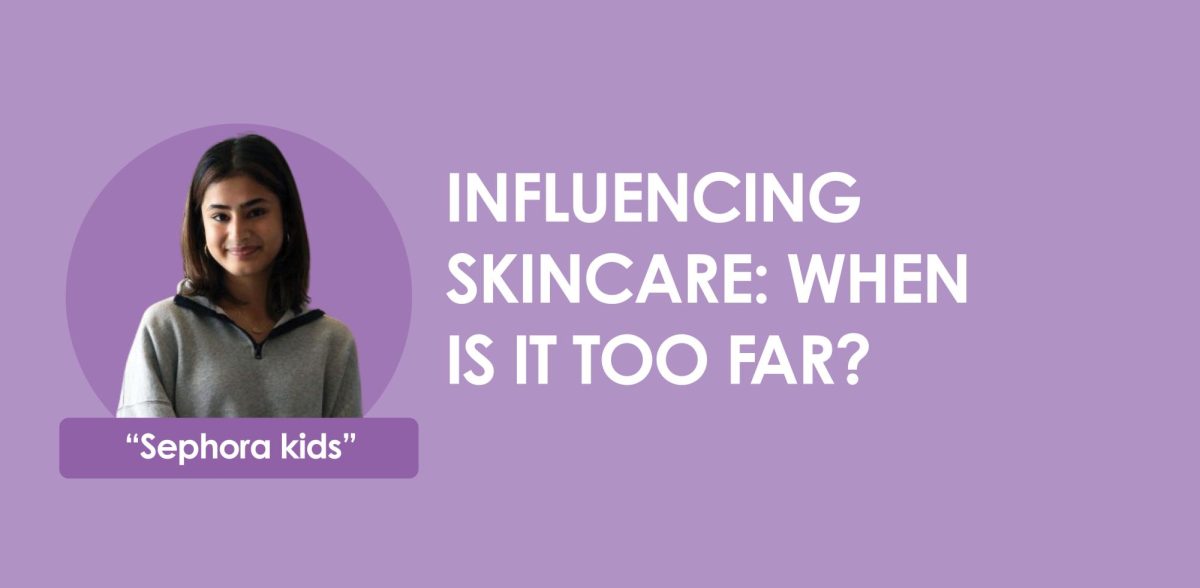With the rise of influencers has come the rise of nepotism-based skincare companies, famous only for the face behind the name. In the age of social media, influencers have become the go-to source for product recommendations, from fashion to beauty. While their insights may be valuable, the recent surge in skincare suggestions on platforms like TikTok has brought to light the potential drawbacks of blindly following influencer advice, particularly regarding skincare.
One of the primary concerns is the inherent diversity of skin types. Each person’s skin is unique and influenced by factors such as genetics, environment, and lifestyle. What works wonders for one influencer may turn out to be a nightmare for another follower with a different skin type. The one-size-fits-all approach that influencers often adopt may lead individuals to try products that are unsuitable for their specific skin needs.
Skincare is a highly personalized journey, requiring tailored solutions based on individual skin concerns. Influencers, while well-intentioned, may not be experts in dermatology or skincare science. Their experiences and success with certain products may be attributed to factors beyond the product itself, such as a different climate, diet, or even a unique genetic predisposition. Ultimately, their true goal is profit, not to genuinely aid their friends.
Furthermore, the rise of the “deinfluencing” trend on TikTok highlights the volatility of product recommendations. In this trend, individuals share their experiences with popular products, often advising against purchasing them. While this may seem like a countermeasure to influencer culture, it also underscores the fickleness of trends and the subjective nature of skincare.
It is important to acknowledge that many of these influencers’ targeted populations and followers are young children, who do not need harsh products or strong chemicals on their skin. The image and representation that these influencers reflect onto these children is inherently harmful and damaging, and simply not something that should be looked up to. I do not think that these are behaviors that children should be exposed to, and children should remain children as long as they can.
The deinfluencing trend on TikTok is a reminder that what works for one person may not work for everyone. Skincare products that are hailed as holy grails by influencers one day may be debunked the next, leaving consumers confused and skeptical. This cycle perpetuates a constant state of trial and error, with individuals experimenting with various products only to discover that the advertised miracles don’t always materialize.
Ultimately, consumers need to approach skincare recommendations with a critical eye and an understanding of their own skin’s needs. Rather than relying solely on influencer endorsements, individuals should prioritize building a skincare routine that caters to their unique requirements.
The views in this column do not necessarily reflect the views of the HiLite staff. Reach Pahal Seghal at [email protected].




























![Keep the New Gloves: Fighter Safety Is Non-Negotiable [opinion]](https://hilite.org/wp-content/uploads/2024/12/ufcglovescolumncover-1200x471.png)
















































![Review: “We Live in Time” leaves you wanting more [MUSE]](https://hilite.org/wp-content/uploads/2024/12/IMG_6358.jpg)
![Review: The premise of "Culinary Class Wars" is refreshingly unique and deserving of more attention [MUSE]](https://hilite.org/wp-content/uploads/2024/12/MUSE-class-wars-cover-2.png)
![Introducing: "The Muses Who Stole Christmas," a collection of reviews for you to follow through winter [MUSE]](https://hilite.org/wp-content/uploads/2024/12/winter-muse-4.gif)
![Review: "Meet Me Next Christmas" is a cheesy and predictable watch, but it was worth every minute [MUSE]](https://hilite.org/wp-content/uploads/2024/11/AAAAQVfRG2gwEuLhXTGm3856HuX2MTNs31Ok7fGgIVCoZbyeugVs1F4DZs-DgP0XadTDrnXHlbQo4DerjRXand9H1JKPM06cENmLl2RsINud2DMqIHzpXFS2n4zOkL3dr5m5i0nIVb3Cu3ataT_W2zGeDAJNd_E-1200x884.jpg)
![Review: "Gilmore Girls", the perfect fall show [MUSE]](https://hilite.org/wp-content/uploads/2024/11/gilmore-girls.png)
![Review in Print: Maripaz Villar brings a delightfully unique style to the world of WEBTOON [MUSE]](https://hilite.org/wp-content/uploads/2023/12/maripazcover-1200x960.jpg)
![Review: “The Sword of Kaigen” is a masterpiece [MUSE]](https://hilite.org/wp-content/uploads/2023/11/Screenshot-2023-11-26-201051.png)
![Review: Gateron Oil Kings, great linear switches, okay price [MUSE]](https://hilite.org/wp-content/uploads/2023/11/Screenshot-2023-11-26-200553.png)
![Review: “A Haunting in Venice” is a significant improvement from other Agatha Christie adaptations [MUSE]](https://hilite.org/wp-content/uploads/2023/11/e7ee2938a6d422669771bce6d8088521.jpg)
![Review: A Thanksgiving story from elementary school, still just as interesting [MUSE]](https://hilite.org/wp-content/uploads/2023/11/Screenshot-2023-11-26-195514-987x1200.png)
![Review: "When I Fly Towards You", cute, uplifting youth drama [MUSE]](https://hilite.org/wp-content/uploads/2023/09/When-I-Fly-Towards-You-Chinese-drama.png)
![Postcards from Muse: Hawaii Travel Diary [MUSE]](https://hilite.org/wp-content/uploads/2023/09/My-project-1-1200x1200.jpg)
![Review: "Ladybug & Cat Noir: The Movie," departure from original show [MUSE]](https://hilite.org/wp-content/uploads/2023/09/Ladybug__Cat_Noir_-_The_Movie_poster.jpg)
![Review in Print: "Hidden Love" is the cute, uplifting drama everyone needs [MUSE]](https://hilite.org/wp-content/uploads/2023/09/hiddenlovecover-e1693597208225-1030x1200.png)
![Review in Print: "Heartstopper" is the heartwarming queer romance we all need [MUSE]](https://hilite.org/wp-content/uploads/2023/08/museheartstoppercover-1200x654.png)




